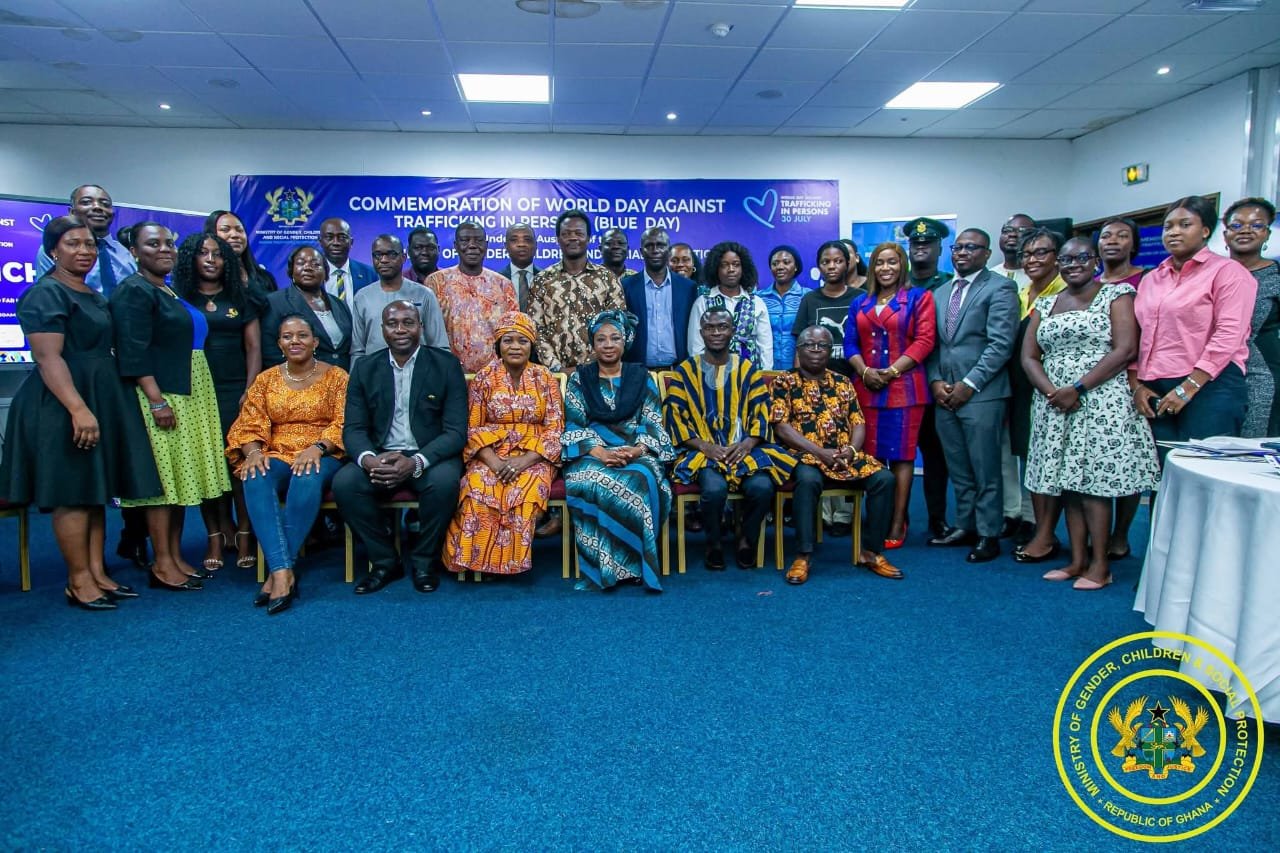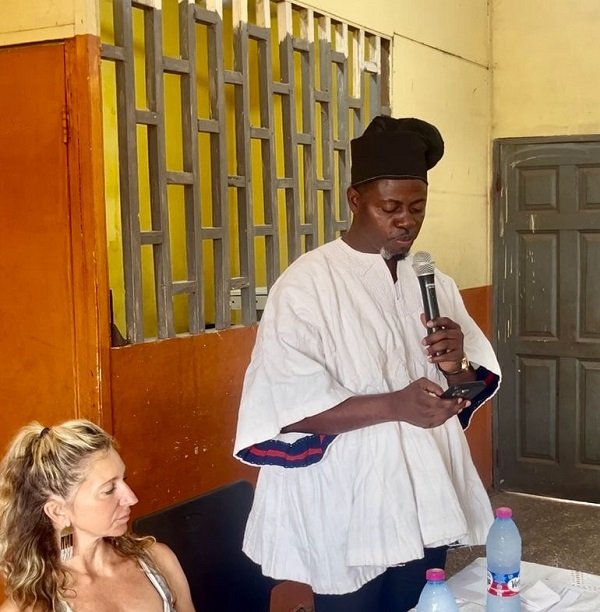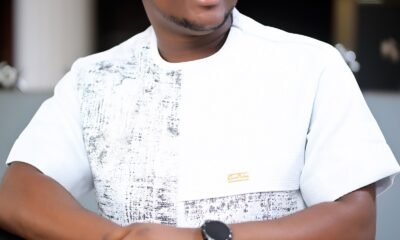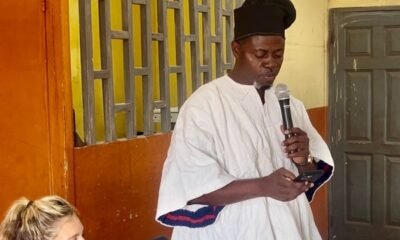News
MoGCSP launches media campaign against trafficking

The Human Trafficking Secretariat of the Ministry of Gender, Children and Social Protection (MoGCSP), in collaboration with development partners, has launched a media campaign ahead of this year’s commemoration of the World Day Against Trafficking in Persons, also known as ‘Blue Day’.
The launch took place on Tuesday, June 24, 2025.
The event, themed: “The Human Trafficking Law @ 20: The Journey So Far in Ghana”, aims to raise awareness about the dangers of human trafficking and marks the 20th anniversary of the passage of the Human Trafficking Act, 2005 (Act 694).
Delivering the keynote address on behalf of the Minister, Dr Agnes Naa Momo Lartey, the Chief Director of MoGCSP, Dr Afisah Zakariah, emphasized the urgency of combating human trafficking, noting Ghana’s position as a source, transit, and destination country.
She called for strengthened legislation and border control systems that do not criminalize victims, and urged the media and the public to work together to break the chains of trafficking in Ghana.
The Chief Director also expressed gratitude to development partners for their continued collaboration and support in fighting human trafficking.
Chairperson of the Parliamentary Select Committee on Gender, Hon. Helen Adjoa Ntoso (MP), lauded the progress made over the past two decades in addressing trafficking.
She emphasized the need for sustained efforts, including the development of new policies, improved coordination among agencies, victim support services, awareness creation, and education.
She also recounted her Committee’s recent visits to shelters in the Greater Accra Region, expressing concern about the continued misidentification of trafficking cases—particularly those involving children.
Director of the Human Trafficking Secretariat, Ms. Abena Anobea Asare, stressed the importance of increasing public awareness and knowledge-sharing on human trafficking. She underscored that combating trafficking requires a collective effort that cuts across legal, humanitarian, and security sectors.
She appealed for renewed commitment to building a just, safe, and inclusive society.
As part of the launch, a panel discussion was held featuring legal, administrative, and security experts who shared insights into understanding human trafficking and charting a way forward.
The media launch forms part of a series of events lined up to commemorate the World Day Against Trafficking in Persons, which will be observed globally on July 30, 2025.
News
Support Street Academy to Break Cycle of Poverty in Society — Odododiodioo MP

Mr. Alfred Nii Kotey Ashie, the Member of Parliament for the Odododiodioo Constituency in the Greater Accra Region, has assured the Accra Street Academy of his support in achieving its mission of uplifting vulnerable children within the community to break the cycle of poverty. “Without the needed support, your efforts may go round in circles due to the enormity of the task. This should not be left on the shoulders of the Academy alone. You need support from both government and the private sector. With that, the Academy would be in a good position to shape the future of these children on the streets,” he said.
The Accra Street Academy, originally formed in 1985 as a boxing arena, now serves as a school for deprived children, with most of its population numbering hundreds of pupils being neglected children from the streets of Jamestown and its environs. Mr. Alfred Nii Kotey Ashie made these remarks at the annual stakeholders’ meeting and fundraising event held over the weekend under the theme “Empowering Street Children: Health and Wellness.” The event is one of the Academy’s annual programmes, organized to raise funds and other forms of support to aid the school in catering to the needs of the children and holding its Christmas get-together.
According to the MP, it is worth noting that these children are taught and provided with two meals and a snack daily through the support of benevolent members of society. In view of this, he promised to facilitate the acquisition of documents needed for the construction of an Astroturf within the school’s premises. He noted that “every child has the right to play, and therefore I pledged to do my best to secure the needed documents” for the project to commence.
The legislator disclosed that over the years, the academic programmes of the Accra Street Academy have transformed children surviving on the streets into successful adults. He therefore urged other members of society to partner with the school to “help pupils rise higher for a better Ghana.” In the 2025/26 academic year, 22 pupils were absorbed by the Accra Metro Education Directorate as they transitioned into various Junior High Schools, while still returning to the Accra Street Academy for academic support.
Ms. Yvonne Abba-Opoku, a chartered governance advisor and senior executive in the nonprofit and charity sector, stated that the best gift to give a child was education.
By Spectator Reporter
Join our WhatsApp Channel now!
https://whatsapp.com/channel/0029VbBElzjInlqHhl1aTU27
News
Attend antenatal clinics for safe delivery … expectant mothers urged

Mrs Regina Kudom, Senior Midwifery Officer at the New Atuabo Health Centre in the Tarkwa Nsuaem Municipality, has urged expectant mothers to attend antenatal clinic regularly for safe delivery.
She revealed that “in Tarkwa and its environs many pregnant women prefer staying at prayer camps, we are not against that, you can be there, but when your time is up for your antenatal session make sure you attend.”
Mrs Kudom gave the advice when the Gold Fields Ghana Foundation (GFGF) observed the World Prematurity Day with pregnant women at New Atuabo, Huniso and Awudua health centres.
World Prematurity Day falls on November 17, every year, and it is celebrated to raise awareness about the challenges faced by pre-term babies and their families.
She said research suggested that sex during pregnancy could soften the cervix and potentially aid in labour preparation.
“That is the reason why we encourage pregnant women to have sex with their partners, if they do not have any health implications,” she added.
Mrs Kudom appealed to the GFGF to upgrade the New Atuabo health centre as the current structure was too small because they received many patients daily.
Madam Ayishetu Mohammed, Project Coordinator for GFGF, explained that they received donations from Project C. U. R. E and the items were given to health facilities in their operational area.
She stated that they noticed there were baby dresses, sanitary pads, and baby apparel, so they decided to distribute them among expectant mothers in three of their host communities.
Madam Mohammed said because the foundation was interested in preventive care, they brought a midwife from the Tarkwa Mine hospital to educate the pregnant women.
She extolled the midwives in New Atuabo health centre for the education they gave to the pregnant women and implored them to heed to the advice given during antenatal visits to reduce maternal deaths in the Tarkwa Nsuaem and Prestea Huni-Valley Municipalities.
Mr Paa Kwasi Egan, Deputy Chief Physician Assistance, emphasised that a pregnant woman being anemic meant she was not eating a balance diet, and added that, “Some of these women do not have money to buy food or visit antenatal clinics.”
He said when men follow their wives for antenatal visits, they would be educated extensively on why they should provide funds for their pregnant wives.
Mr Egan, therefore, encouraged all men to be involved in their pregnant wives’ antenatal care appointments so they could learn more about pregnancy, childbirth, and parenting. – GNA















